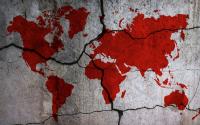1 March 2006 J. Sri Raman
George W. Bush arrives in India late Wednesday evening, but much has preceded him. Like the media hype over the "historic visit," for example. And the whole retinue of US officials, including Under Secretary of State for Political Affairs Nicholas Burns, all at pains to prepare the ground for a safe and successful state visit.
More notable than this advance party, however, is the shadow of a nuclear militarism preceding the presidential visit. The Bush mission, it is already and abundantly clear, bodes ill indeed for South Asia, besides the entire neighborhood.
Finalization of a US-India nuclear deal, proposed during Prime Minister Manmohan Singh's visit to Washington last July, has figured most prominently in the preparations on both sides for the visit. The purported deal for unprecedented US-India cooperation in the field of civilian nuclear energy "for peaceful nuclear purposes" is serving precisely the opposite result.
Discussions on the deal have drawn out the most unambiguous and unabashed official statement thus far on New Delhi's determination to carry forward its nuclear development program. The Prime Minister himself has spelled out his government's resolve to persist in the perilous course on which its far-right predecessors had set the country.
Speaking in the Lok Sabha (the lower house of India's Parliament) on Monday, Singh declared that the deal would impose "no cap" at all on India's nuclear weapons program. He added for emphasis that his government would accept no compromise on the country's "strategic interests," a euphemism for a military or even militarist agenda. He had earlier made repeatedly clear that New Delhi looked upon the deal as part of an India-US "strategic partnership."
The far-right Bharatiya Janta Party (BJP), the main opposition in Parliament, had earlier raised apprehensions that the deal would entail a "cap" on plans to augment the country's nuclear arsenal. BJP veteran and former Prime Minister Atal Bihari Vajpayee, architect of India's nukes program as also of the "India-US strategic partnership," had been quick to react to the July accord with questions on this count.
Singh has not really cared to answer the critique from the left about the satellite-like role assigned for India in the strategic partnership, but he has hastened to reassure the far right on its only reservation about the deal.
Closely and crucially related to India's strategic military nuclear program is the issue of the separation of the country's civilian and nuclear facilities. It is on this issue that the talks preparatory to the Bush visit have remained inconclusive until the time of writing. Indications are, however, that Washington may eventually let New Delhi have its way on this aspect of the deal. Few will believe that Singh would have made so bold a statement in Parliament without an unofficial green signal from the Bush regime.
These developments have had a predictable consequence: the demand from Pakistan for a similar deal. Some perceptive US congressmen have already voiced fears that Washington may find it hard to say no to the demand from what it still considers its "frontline state." The US president, in fact, is credited in some reports with seeing the deal with India as part of a series of similar packages with other countries.
For South Asia, such a sequel to the deal will spell a disastrous spiral in a nuclear arms race. In the summer of 2002, the sub-continent came to the brink of a nuclear war, with the armies of India and Pakistan facing each other across the entire border while the leaders of the two countries lobbed nuclear threats at each other. If the deal goes through, or if the deals do, and if the nightmare repeats itself two years down the line, it will have a far more frightening nuclear dimension.
Another predictable consequence of the deal will be a closer India-US partnership on the Iran question. Two days after Bush leaves India for Pakistan, the International Atomic Energy Agency (IAEA) will meet again on the issue in Geneva. Thus, March 6 may well mark the indirect proclamation of a strategic India-US partnership in the Middle East, with all its imponderable consequences.
The dear hope of the hawks here is that the already infamous deal, legitimizing India's nuclear-weapons program, will turn India into a South Asian Israel. They could not care less, of course, what this will mean for the impoverished millions of the region. But the people do care. Which is why Bush will be greeted, all along his Indian route, with black flags and placards asking him to go back home.
A freelance journalist and a peace activist of India, J. Sri Raman is the author of Flashpoint (Common Courage Press, USA). He is a regular contributor to t r u t h o u t.






